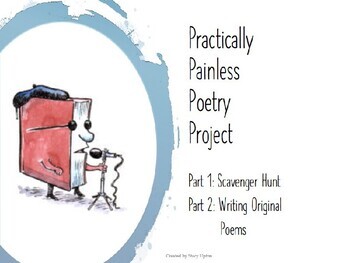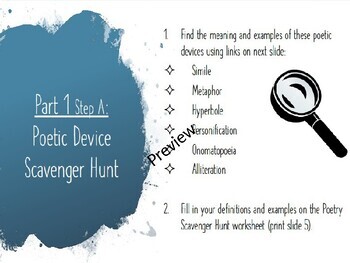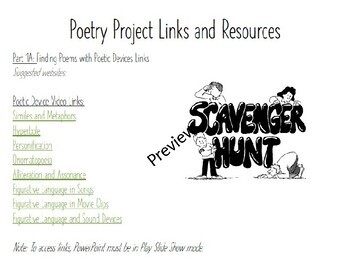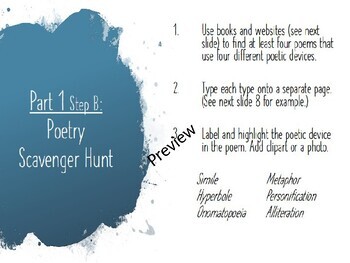Practically Painless Poetry Project Scavenger Hunt w/ printable & digital links
SU Creations
26 Followers
Grade Levels
3rd - 6th
Subjects
Resource Type
Standards
CCSSRL.4.2
CCSSRL.4.5
CCSSRL.4.10
CCSSL.4.5a
CCSSCCRA.R.4
Formats Included
- Zip
- Webquests
Pages
28 pages
SU Creations
26 Followers
Compatible with Digital Devices
The Teacher-Author has indicated that this resource can be used for device-based learning.
Description
This is a fun project to learn about poetic devices and different types of poems!
In part 1, students will go on a scavenger hunt using provided links to learn about figurative language and to search for poems containing figurative language (simile, metaphor, hyperbole, alliteration, onomatopoeia, and personification).
After reading a variety of poems in part 1, students will be introduced to different poetry formats, and write their own poems for part 2.
Sample project pages, directions, links, and many poem styles are included in the PDF slides.
Included:
Practically Painless Poetry Project Slides
Poetry Term Scavenger Hunt Worksheet
PPPP Directions Handout
PPPP Grading/Evaluation Sheet
Total Pages
28 pages
Answer Key
N/A
Teaching Duration
3 Weeks
Report this resource to TPT
Reported resources will be reviewed by our team. Report this resource to let us know if this resource violates TPT’s content guidelines.
Standards
to see state-specific standards (only available in the US).
CCSSRL.4.2
Determine a theme of a story, drama, or poem from details in the text; summarize the text.
CCSSRL.4.5
Explain major differences between poems, drama, and prose, and refer to the structural elements of poems (e.g., verse, rhythm, meter) and drama (e.g., casts of characters, settings, descriptions, dialogue, stage directions) when writing or speaking about a text.
CCSSRL.4.10
By the end of the year, read and comprehend literature, including stories, dramas, and poetry, in the grades 4–5 text complexity band proficiently, with scaffolding as needed at the high end of the range.
CCSSL.4.5a
Explain the meaning of simple similes and metaphors (e.g., as pretty as a picture) in context.
CCSSCCRA.R.4
Interpret words and phrases as they are used in a text, including determining technical, connotative, and figurative meanings, and analyze how specific word choices shape meaning or tone.





